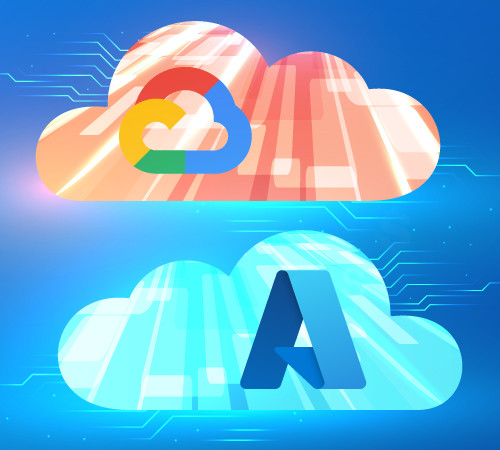AWS vs. Azure pricing comparison will help users identify the cheapest instances for similar benefits and requirements. As the top two cloud computing platforms have dropped their prices by adding discounts and free tiers, it’s worth noting the various aspects before choosing one.
Amazon AWS vs. Azure pricing comparison is always an arduous task for business owners. If you are an enterprise owner wanting to choose a cost-effective and affordable cloud computing platform, this guide will help you out.
Microsoft Azure and Amazon Web Services are the best cloud computing platforms of 2023. They both offer different services and solutions to the users.
The best part about the two cloud service providers – AWS and Azure – is you can deploy the services on-premises, cloud, or as a hybrid setup. However, it is still worth noting that both platforms have different pricing structures.
This article on AWS vs. Azure pricing comparison will help you understand their pricing models and which one has an upper over the other in terms of affordability.
Amazon AWS Cloud Pricing Model
Cloud platforms like AWS secure cloud work on a pay-as-you-go model. The best part is that AWS offers services without upfront payments, contracts, or cancellation fees. You can start immediately and customize the AWS cloud solution services per your needs.
Below are the four main pricing models provided by Amazon Web Services or AWS cloud service providers.
- On-Demand: It allows you to use AWS’s Amazon virtual private cloud services anytime. Services are generally billed by the hour or second of actual use. Even though it provides a lot of flexibility, it becomes an expensive option in the long run.
- Saving Plans: The AWS public cloud services offer a plan that allows you to use AWS Lambda, AWS Fargate, and Amazon Elastic Compute Cloud at a low cost. When you commit to a one or three-year contract, you get 72% off on on-demand pricing.
- Reserved Instances: It allows you to save around 75% with a fixed one or three-year period. In this type, you’ll have to pay some or the total upfront amount, which affects the level of discount you receive.
- Spot Instances: The pricing mechanism lets you buy Amazon’s spare compute capacity at a 90% discounted rate than an on-demand rate. It can be interrupted with only 2 minutes’ notice.
Calculate the estimated price using the AWS cost calculator.
Microsoft Azure Cloud Pricing Model
Now that you know how AWS charges, it’s time to understand the charges of the Azure SQL Server database compared to AWS.
- Pay-As-You-Go: Upon comparing AWS and Azure pricing, the main difference is the billing time. Microsoft Azure virtual network charges users per second based on the actual usage with no upfront costs and long-term commitments.
- Reserved VMs: This pricing structure allows Microsoft Azure users to enjoy 72% in exchange for a long-term commitment.
- Spot VMs: Unlike pay-as-you-go rates, spot VMs enable you to purchase spare compute Azure capacity at a 90% discount. However, it is less advanced than Amazon as it provides only 30-second advanced notice.
- Azure Hybrid Benefit: The BYOL (bring your own license) model allows you to leverage the existing license for Microsoft products such as Microsoft SQL Server or Windows Server to get discounts.
Though AWS has more instance types than the Azure cloud platform, enterprises should choose the one depending on their needs and the required storage service.
Calculate the estimated price using the Microsoft Azure cost calculator.
AWS Vs. Azure Pricing Comparison
Here is the infographic representation of Amazon AWS vs. Azure pricing cloud platform comparison.

Azure stands neck and neck with AWS public cloud when it comes to cost-effective hybrid models. However, there are still some differences between Amazon AWS and Microsoft Azure in the two major cloud service plans: free tier and support plans.
Free Tiers
Before committing to any hybrid cloud and integrating it into business, accessing the service AWS and Azure provide through the free tier plan available is best.
AWS cloud provider, followed by Azure, is the leading platform in the cloud domain with a high market share. It organizes its free services into three categories.
- AWS free trials allow you to test a service for a specified number of hours, maximum usage amount, or days.
- The 12-month free usage option enables you to use different services until the limit is reached or you complete one month.
- ‘Always free option’ available allows you to enjoy particular services for no charge.
Upon signing with the Microsoft Azure cloud computing solution, you receive $200 worth of credits with which you can get two options.
- One year of free usage of varying databases, computing, AI/machine learning, media, integration, and networking services.
- Azure offers users the 40 Azure services for free forever across compute, database, security, analytics, etc.
Support Plans
You can choose from four Amazon Web Services cloud support plans available. Everyone can access free support through 24*7 customer service, whitepapers, and AWS documentation.
Four levels of premium support are
- Developer
- Business
- Enterprise On-Ramp
- Enterprise
The costs start at $29 per month and go up to $1500 per month. Pricing is based on the percentage of AWS service you use.
Azure also charges based on which support plan and storage service you choose. The four support plan available include:
- Basic
- Developer
- Standard
- Professional Direct.
All the Azure customers get free basic support, whereas, for other Azure plans, you’ve to pay $29-$1000 monthly.
Check out our AWS vs. Azure vs. Google Cloud Platform in our detailed guide.
AWS Or Azure: Which Cloud Platform To Choose
In a nutshell, the right choice between AWS vs. Azure pricing will depend on your requirements for cloud computing solutions. Amongst AWS and Azure expenses, Azure’s storage price is slightly lower than AWS’s.
When we dive deeper, we can say that amongst Azure and AWS, the latter is cheaper than the former on computing, whereas Azure is more cost-effective than Amazon on storage. But, of course, it can vary depending on the price and service combination of your choice.
If you want to understand AWS vs. Azure pricing of cloud infrastructure deeply or migrate big data to the cloud, contact Inferenz experts today!













